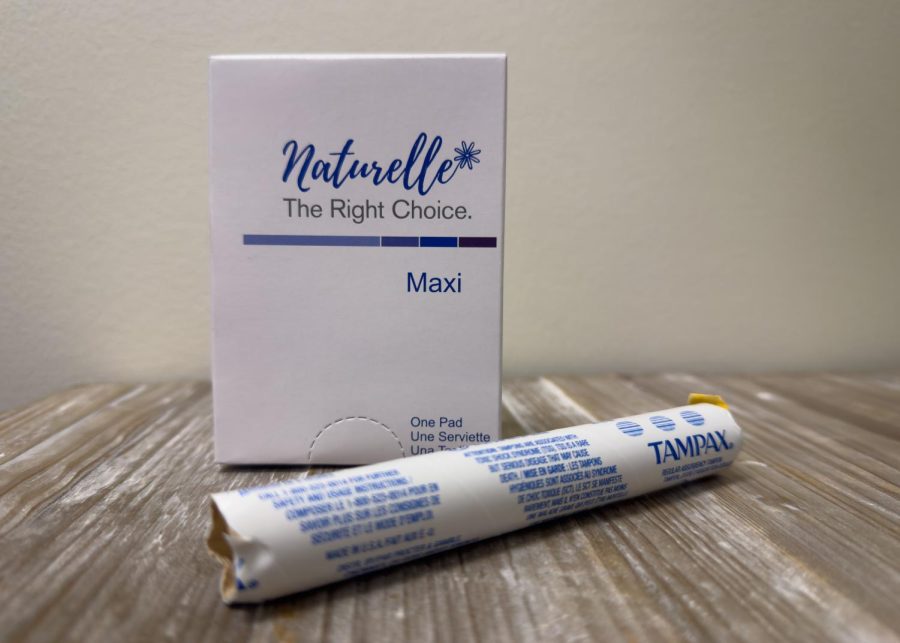Free period products now available on campus
AU starts providing period products in accordance with the Period Product Act
Free period products are now available in many women’s and gender-neutral bathrooms across campus. American University began installing period product dispensers in early February in accordance with the Period Product Act.
The Period Product Act went into effect on Jan. 24, 2022. It legislates free menstrual products in women’s and gender-neutral bathrooms in Washington’s public and private high schools and universities.
In a press conference on Feb. 10, Bronté Burleigh-Jones, CFO, vice president and treasurer at AU, said the law prompted the installation of the period product dispensers.
“We are now required to do this thing, let’s do this well for our community,” Burleigh-Jones said.
According to a 2021 study by BMC Women’s Health, 14.2% of women experience period poverty monthly. Period poverty is a “lack of access to menstruation products, hygiene facilities, waste management, and education,” according to a 2022 Journal of Global Health Reports study.
According to an email sent out by Burleigh-Jones, AU began to install Evogen period product dispensers in over 330 women’s and gender-neutral bathrooms across campus on Feb. 6. The dispensers will provide free menstrual products to staff and students at AU.
First-year student Chloe Schidlowski lives in the freshman dorms and uses the communal bathrooms in the dorms and around campus. She said when she first saw the announcement, she loved it.
“My first reaction was, ‘Okay, is it gonna be like three bucks per tampon?’ like, because of where we go,” Schidlowski said. “But the fact that they’re free? I was stoked.”
According to the Journal of Global Health Reports study, 10% of menstruating college students experience period poverty monthly. Period poverty can be related to the accessibility, affordability, environmental or even cultural factors surrounding menstruation.
Lynsey Miller, a sophomore, said she wondered why AU did not implement this program sooner.
“I mean, it’s a step in the right direction because, like, period products are expensive, so offering them at school is beneficial,” Miller said.
According to the 2021 study from BMC Women’s Health, period poverty in schools can lead to absenteeism and drop outs. Young women who experienced period poverty were also more likely to report moderate to severe depression than those who did not.
According to the Alliance for PERIOD supplies, accessibility to period products in schools reduces period poverty, enables students to attend classes and fosters gender equity.
Schidlowski said she had experiences without accessible period products.
“The amount of times I’ve had to, like, sprint home. Like, I start my period in, like, the middle of class, like unexpectedly, and I have to sprint back to my dorm, like, grab a tampon, then, like go back to class, like be late or something,” Schidlowski said. “It’s just a lot easier to have them, like, accessible everywhere.”
A working group of students and staff considered and recommended the dispensers and period products. The students chosen were student leaders from organizations such as the Residence Hall Association and the Graduate Leadership Council.
According to an email to the community, the working group considered aesthetics, availability, maintenance and cost. Evogen fits its standards and can accommodate different brands of period products. The period products chosen are sustainable and fit the Evogen dispensers.
Schidlowski said she likes the look of the dispensers.
“I like the way that they’re designed to just kind of, like, fit in,” Schidlowski said. “Like, hey, this is nothing special. This is just like a regular thing, which it should be.”
In discussing the program during a press conference, Burleigh-Jones said she had not heard any criticisms and did not expect any. She said that while there are always concerns, she fully supports the program.
“Making these products available in restrooms around our campus, I fully support that, and having them available in the restrooms for ease of use and access makes sense,” Burleigh-Jones said in the press conference.
According to the press conference, this program had been piloted for three years prior, with glass dispensers in three academic buildings: Kerwin, Kogod and Battelle.
The administration used the piloted program to gauge the program’s popularity, allowing it to estimate the amount of use the dispensers would have. The administration bought enough period products to last six months based on the estimated amount of use.
When asked if this program was ready to support a large part of the AU community, Elizabeth Deal, the assistant vice president for community and internal communications, said that AU is ready to support its students who menstruate.
“Reproductive justice – this is part of it. This is part of what we are doing for our community,” Deal said in the press conference.
According to the press conference, the university brought in two teams of contractors and architects to install the machines. There were regulations regarding where the dispensers could be placed in each bathroom, so architects evaluated those barriers.
The administration said in the press conference that installations have taken anywhere between 15 and 45 minutes to complete. A Facilities Manager has accompanied installations in residence halls.
In the press conference, the administration said that housekeeping is in charge of keeping the dispensers in stock, as they check each restroom daily. If a restroom runs out, students are encouraged to call the 2Fix hotline to get it refilled.
The Period Product Act says that if no gender-neutral bathrooms are available, period products will be available in high school men’s bathrooms. The same legislation for men’s bathrooms does not extend to universities.
Burleigh-Jones said putting period products in men’s bathrooms was not part of the working group’s discussion. However, they did have a member in the working group who works with the transgender community, and they trusted that this person was conversing with trans students about the issue.
According to the Alliance for PERIOD Supplies, 15 states and the District have passed legislation ensuring that menstruating people can access free menstrual products in schools. An additional five states have grant funding available for schools that provide free period products to their students. So far, the District is the only place that mandates free period products for private universities.
Miller said she supports this program and having these products in schools.
“I think that all women and anybody who menstruates should have access to period products because it’s like, it’s like a necessity, you know?” Miller said. “It’s not –you don’t choose to have your period.”

Kalie Walker (she/her) is a junior studying journalism. Outside of AWOL, Walker enjoys crocheting, writing and swimming.

Maegan Seaman (She/Her) is a senior pursuing a broadcast journalism major and political science minor. She loves hiking and kayaking, photography, and...









